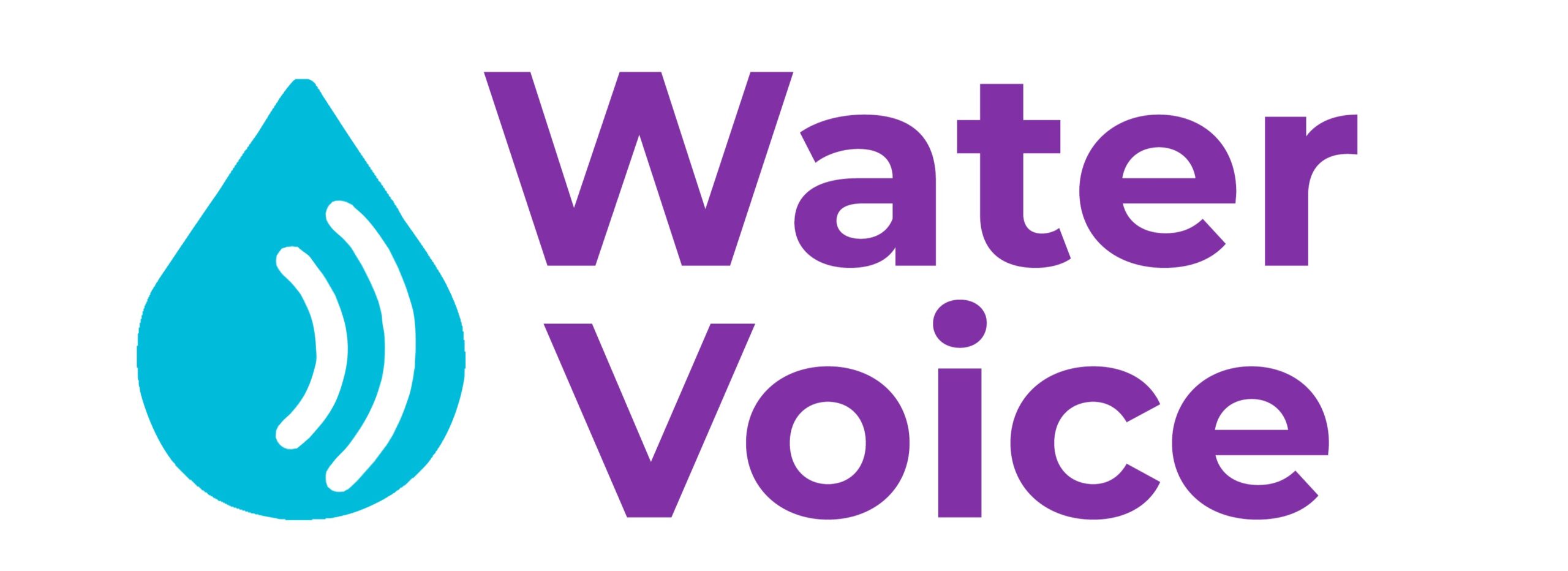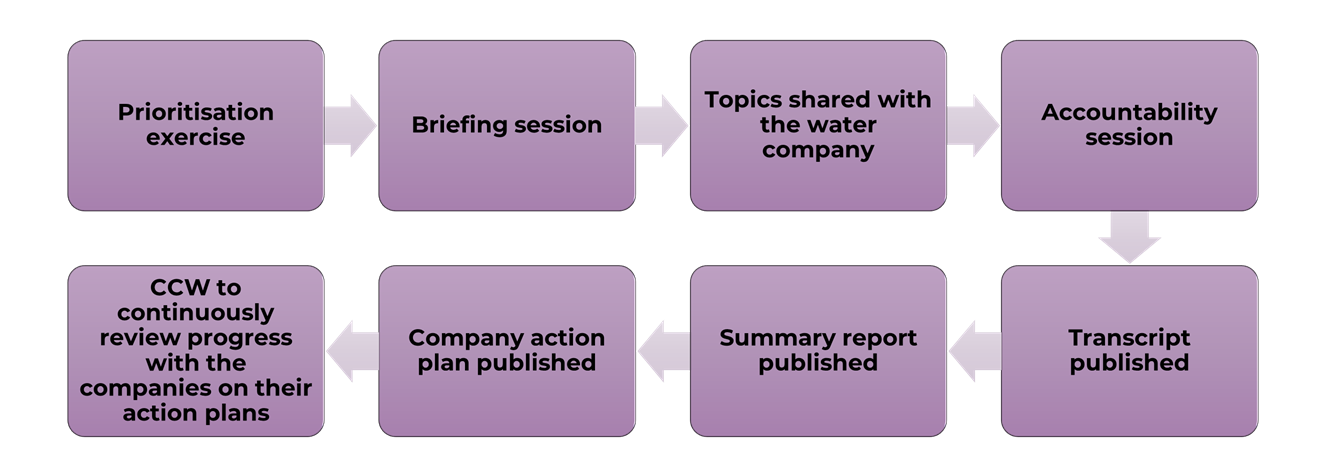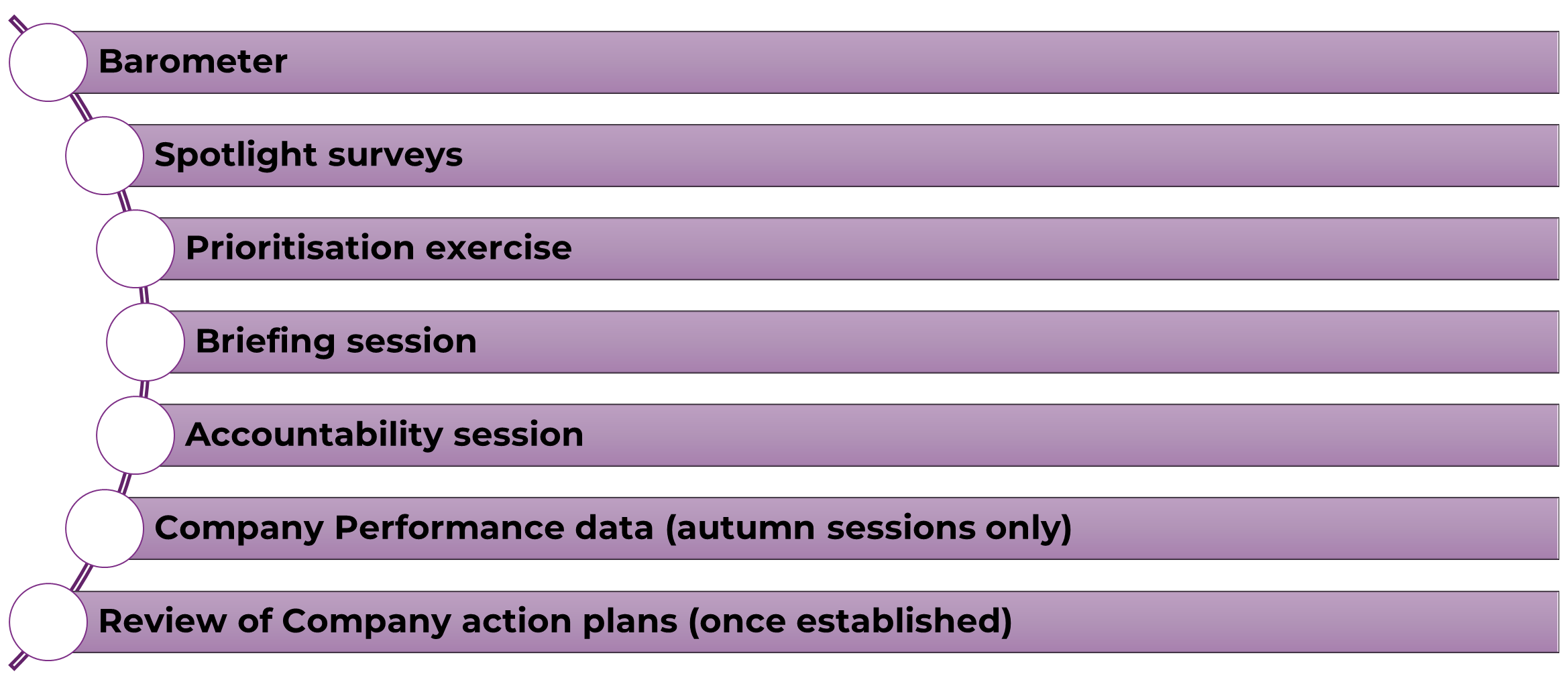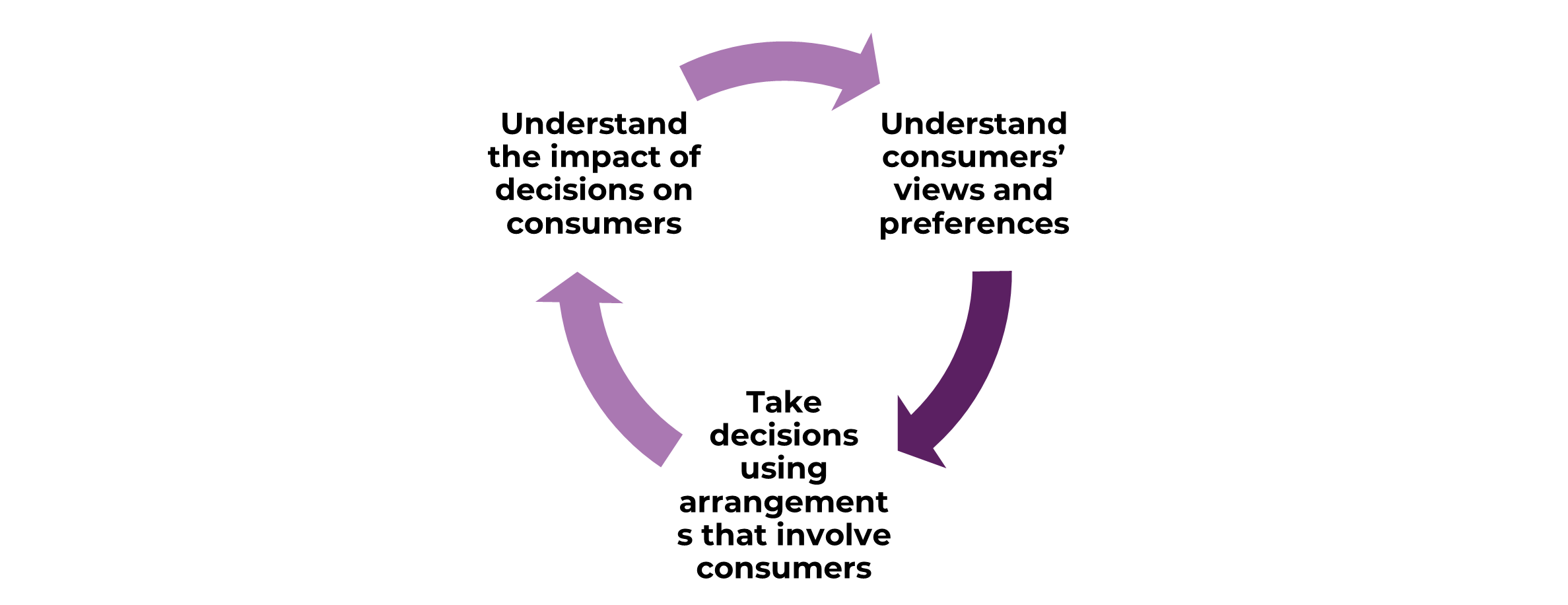CCW has partnered with Taylor McKenzie Research to run water consumer panels across England and Wales.
Known collectively as Water Voice, there are 16 panels in total – one for each water company area.
These panels allow household consumers to share views directly with CCW and their water company, helping companies listen, learn and act on feedback to improve services and strengthen accountability.
Panellists take part in regular surveys and attend Accountability Sessions with water company executives to share their experiences and ideas. CCW shares insights from these across the sector, ensures companies take clear actions and tracks their progress to make sure panellists’ concerns are followed up.
The panels
- Affinity Water
- Anglian Water
- Dŵr Cymru Welsh Water
- Hafren Dyfrdwy
- Northumbrian Water and Essex & Suffolk Water
- Portsmouth Water
- SES Water
- Severn Trent Water
- South East Water
- South Staffs Water and Cambridge Water
- South West Water, Bristol Water and Bournemouth Water
- Southern Water
- Thames Water
- United Utilities
- Wessex Water
- Yorkshire Water
This page will host the panels’ monthly Barometer & Spotlight survey findings, Accountability Session transcripts and company action plans. Transcripts from the Accountability Sessions will be available from spring 2026.
Barometer & Spotlight reports
Our findings are designed to track what matters most to community members in the months leading up to an Accountability Session, and to flag emerging or strongly held views that may warrant further exploration, including the potential for an ad-hoc Accountability Session.
All findings are qualitative and are not statistically representative.
Each community consists of around 50 members, meaning that a small number of participants expressing very strong views, for example in response to an issue which becomes high-profile in the media, can influence overall sentiment (e.g. around a ±10% movement).
It is important to note that, with a small number of exceptions, dashboard trends broadly align with wider industry expectations and findings from larger-scale industry research.
While a negative score (such as –10%) should not be viewed as a cause for alarm in isolation, it is a prompt to explore why customers feel this way and what could be done to improve perceptions or experiences in that area.
Where negative sentiment is sustained on certain issues (e.g. sewerage satisfaction), this indicates a strongly felt concern within the community and is likely to be raised as a priority topic within an Accountability Session.
Reports are available in Welsh upon request. Please contact [email protected].
'Getting to know you' report
The ‘Getting to know you’ report provides key demographic and accessibility information for each Water Voice community, capturing who the panellists are, how they use water and what issues matter most to them.
1. Introduction
Here we outline the structure, roles and processes for the Water Voice consumer panels’ Accountability Sessions.
In this Terms of Reference, ‘consumer panellists’ or ‘panellists’ are used interchangeably and refer to consumers who are recruited to be part of CCW-run consumer panels, and excludes any entities or individuals from CCW, the research agency, subject matter experts and water companies. ‘Consumers’ refers to consumers of the water sector generally, including those consumers that are not currently part of the consumer panels.
2. Overview of the Accountability Sessions
The Accountability Sessions are a mechanism for customers to hold water companies to account on their performance and services. They allow consumer views to be heard and to be considered as part of company decision-making, as stated in the Water (Special Measures) Act 2025.
Progress against companies’ key performance commitments will be shared with the panels, and the Accountability Sessions provide an opportunity for the panellists to question companies on actions taken to address consumer issues. They enable consumers to be involved in company decisions that have a material impact on consumer interests, as stated in the Water Industry Act 1991, Section 35B.
The aim of the Accountability Sessions is to facilitate a two-way discussion where consumer panellists are empowered to raise concerns, ask questions and challenge water companies on areas of perceived poor performance and issues of interest. Panellists will be supported by insights obtained from the consumer panels’ research and significant events that are relevant to their service provider.
Consumer panellists will set the direction of the discussion at the Accountability Sessions following a prioritisation exercise led and facilitated by CCW and Taylor McKenzie Research, the appointed research agency.
There will be two Accountability Sessions each year:
- The autumn sessions will focus on company service performance.
- The spring sessions will consider how far companies have met their action plans coming out of the autumn session. Within this, panellists will also be able to raise additional areas of concern with their company.
In addition, should panellists wish to raise issues with companies at other times during the year, ad-hoc Accountability Sessions may be held, for example following a significant service failure.
2.1 Scope
The Accountability Sessions for each panel will:
- Be held at least twice a year with additional sessions held if required.
- Be facilitated by Taylor McKenzie Research.
- Focus on reviewing company service performance in the areas that matter most to panellists.
- Focus on issues that have a material impact on the consumer experience, such as bill levels, water resources, environment, affordability and customer service, etc.
- Include agreed actions with a timescale jointly determined by the panel and water company.
- Be reportable, with transcripts, summary documents and action plans published online.
- Be chaired by a member of the CCW Board.
2.2. Accountability Session process
Please note that the first Accountability Sessions planned for spring 2026 will have a different agenda to support the launch of the sessions.
The planning and running of each session will be led by the panellists’ availability but will involve co-ordination of the availability and contribution of several other key parties, including:
- CCW
- The water company
- Taylor McKenzie Research
3. Statutory obligations
As published in Ofwat’s consultation into the Consumer Involvement Rule on 14 August 2025, companies must engage with the consumer panels by ensuring that at least one senior executive attends the Accountability Sessions. It says that companies must share a summary with their Board.
4. Research agency
Taylor McKenzie Research has been appointed by CCW as the independent research partner to design, deliver and facilitate the Water Voice consumer panels and associated Accountability Sessions.
As the appointed research agency, Taylor McKenzie is responsible for ensuring that the sessions are robust, inclusive and evidence-led. The sessions will provide a transparent, well-structured forum through which customers can hold water companies to account for their performance and commitments.
The agency plays a central role in bringing together insight from panel activities, supporting panellists in preparing for meaningful participation and ensuring that the outcomes of each Accountability Session are clear, measurable and reported in line with CCW’s objectives and the Ofwat Consumer Involvement Rule.
4.1. Background
Taylor McKenzie is a specialist research agency with extensive experience in consumer engagement, qualitative facilitation and consumer accountability frameworks.
The agency is responsible for managing all aspects of the Water Voice consumer panels including recruitment, onboarding, research design, data collection, community management and delivery of the Accountability Sessions.
Our approach ensures that each Accountability Session will:
- Be grounded in consumer evidence collected through monthly panel surveys (“barometer” and “spotlight” surveys) and community discussions.
- Reflect local priorities, drawing on issues raised by customers in each water company’s region.
- Build participant confidence and knowledge through structured briefing sessions and preparatory materials.
- Result in clear, actionable outcomes that are recorded, monitored and reported publicly to strengthen accountability.
Taylor McKenzie operates under the Market Research Society (MRS) Code of Conduct and UK GDPR, ensuring all participant data is treated with confidentiality, fairness and respect.
4.2. Roles and responsibilities
The research agency’s key roles and responsibilities are to:
- Facilitate the accountability process
- Plan and deliver the pre-session briefing workshops to help panellists understand key company performance data, action plans and relevant consumer insights.
- Facilitate the Accountability Sessions themselves, ensuring open, respectful and balanced discussion between company representatives and panellists.
- Support CCW’s Board Chair in managing the session structure, timekeeping and moderation of panellist questions.
- Provide analytical and research support
- Gather, analyse and integrate data from the panel surveys and discussions to inform the session agenda.
- Support CCW in identifying emerging consumer themes and tracking company performance trends over time.
- Produce post-session summaries and input into the preparation of action plans and evaluation metrics.
- Ensure inclusivity and participant support
- Manage communications with panel members, ensuring accessibility for participants with different needs, digital skills and levels of confidence.
- Ensure diverse representation in line with demographic targets for each water company region.
- Maintain a safe, respectful environment for all participants, ensuring adherence to the MRS Code of Conduct.
- Reporting and evaluation
- Deliver accurate transcripts and high-quality summary reports following each session in line with CCW’s publication deadlines (5 and 10-day requirements).
- Evaluate session effectiveness by capturing panellist feedback and lessons learned for continuous improvement.
Through these responsibilities, Taylor McKenzie will ensure that the Accountability Sessions serve as a credible, trusted and impactful platform for the customer voice and company accountability across England and Wales.
5. Panel members
Water Voice panel members represent people in their local area, from all walks of life, sharing their experiences, views and ideas about water and wastewater services and the company that provides them. Panel members will do this by taking part in regular online activities and occasional group discussions. Their insights will directly inform how water companies can improve, helping drive real change, transparent accountability and concrete actions that lead to better services, fairer outcomes and greater environmental responsibility.
5.1. Roles and responsibilities
1. Panel members will take part in a mix of online surveys, discussions and Accountability Sessions throughout the year. They will be supported by members of Taylor McKenzie Research every step of the way, with clear instructions, reminders and incentives for their time
2. Panel members will complete a simple virtual onboarding and registration process to confirm their place, including downloading the Water Voice panel app and signing up to the Water Voice online community.
3. At the start of each month, Taylor McKenzie will send panellists a ‘spotlight’ survey – a short set of questions on a current theme or issue that matters to customers, such as water quality, customer service or protecting the environment. Midway through the month, panel members will also be asked to complete a short ‘barometer’ survey – a quick check on how they feel their water company is performing and how satisfied they are with the service they receive. The ‘spotlight’ survey helps explore new ideas and emerging issues as they happen, while the ‘barometer’ survey helps track changes over time and allows panellists to share what is working well and where improvements are needed. Together, the results will help identify and prioritise the key issues to be raised with water companies.
4. As part of the onboarding process, panel members will be asked to join an interactive, Facebook-like, online space where they can engage with other panellists and take part in discussions focused on their local water company. Each week, panel members will be able to access and contribute to around 3–4 new posts, including news stories, water-saving tips, short quizzes and polls. This online community provides a platform for members to share their experiences, raise concerns and join conversations about how their water company is performing. It is designed for open, respectful conversation, where the insights consumers provide help hold water companies accountable and ensure they deliver on their promises to customers across England and Wales.
5. Over the course of the 12-month panel, there will be at least two Accountability Sessions. Taylor McKenzie Research will ensure that as many panel members as possible are invited to take part in at least one. If some members are not selected for that session, they will still be able to watch it live and share their thoughts and feedback through the online community – their voices will continue to be an important part of the process. Panellists who are especially interested in joining one of these sessions will be encouraged to express their interest to the Panel Support Team during onboarding.
6. Before each Accountability Session, panel members will take part in a two-hour online briefing session designed to help them feel informed and confident. These briefing sessions will help them learn more about their water company’s performance, decide which topics and questions matter most and understand exactly how the upcoming Accountability Sessions will work.
7. Being a panel member is an important commitment. Panellists will help shape how water companies listen and act on customer views over a 12-month period. Consumers recruited as panel members will be expected to stay engaged and participate regularly throughout the year.
5.2. Overview of panellists’ tasks
6. Attendees
The members of the Accountability Sessions will include:
- Consumer panellists
- CCW Board member (Chair)
- Taylor McKenzie Research
- Key water company representatives, such as CEOs and Senior Executives (membership may vary from meeting to meeting to ensure that people with the relevant knowledge are in attendance to be able to answer panellists’ questions).
- Other relevant stakeholders, e.g. regulators for the water industry in England and Wales and Chairs of the Independent Challenge Groups (ICGs), will be invited to observe the meeting. They can nominate a delegate to attend in their absence if they wish.
7. Briefing sessions
7.1. Overview
Prior to the Accountability Sessions, consumer panellists will undertake a series of activities to help prepare them. This includes identifying the key issues and agenda topics for the session and familiarising themselves with the latest information, including company performance data, the most recent company action plans and results from the monthly barometer1 and spotlight surveys.2
Panellists will first complete a prioritisation exercise and read any pre-reads ahead of the briefing sessions. The prioritisation exercise will take the form of moderated discussions and activities to collectively agree which issues are the most important for the panel to raise in the Accountability Sessions. It will also capture key issues or concerns arising from engagement activities on the online community platform.
CCW will then hold a briefing session with the panellists, which will be facilitated by Taylor McKenzie Research. The session may also be attended by CCW’s policy leads, company engagement managers or external subject matter experts depending on the key topics or themes covered. Company representatives will not be in attendance at the briefing sessions.
Panellists will be required to attend all briefing sessions to be prepared for the activities in the Accountability Sessions. This will also help them to prioritise what topics they would like to discuss with their company.
CCW and Taylor McKenzie Research will also hold dedicated briefing sessions for the Chair of the Accountability Session to ensure that they are updated on the key agenda items.
Following the publication of company performance data in July each year, the autumn briefing sessions will include the latest performance data.
7.2. Code of Conduct
During the briefing sessions, panellists will be briefed on the Code of Conduct and key themes considered for the Accountability Session.
Panellists attending the briefing sessions are encouraged to act in the spirit of making improvements across the whole consumer base.
Please refer to Appendix 11.4 for the general Code of Conduct for all briefing and Accountability Sessions.
8. Accountability Sessions
8.1. Arranging the sessions
CCW will liaise with Taylor McKenzie Research, the panellists and the company to agree the time and date of each Accountability Session. The invites for the sessions will be managed by CCW. The agenda for each session will be circulated one week in advance.
8.2. Technology
Each Accountability Session will be held as a virtual meeting.
CCW has carefully considered the merits and potential drawbacks of ‘virtual’ and ‘in person’ sessions. Due to the disparate and distant geographical areas covered by some water companies, we have decided that a virtual meeting is most likely to allow more people to attend from a variety of backgrounds. Attendees will need access to Zoom on a phone or laptop, along with a webcam to support interactivity.
8.3. Reporting
CCW will publish a transcript of the discussion at each Accountability Session within 5 working days and publish a summary of the key points discussed within 10 working days.
The transcript will be a true record of what was said but will not name individual panellists. All attendees must be mindful of this. Panellists can contact Taylor McKenzie Research within 3 working days of the meeting if they want any sensitive information redacting.
To help create a written record of the Accountability Session, the meeting will be recorded by Taylor McKenzie Research on behalf of CCW. Attendees will be informed in advance that the meeting is being recorded and the facilitator or Chair will remind all attendees at the start of the session. The recording will be deleted once the transcript is completed.
Following the session, a series of reports will be published. Progress against the action plan will be followed up with the water company by CCW. As appropriate, they will be shared with relevant stakeholders.
8.4. Launch of the Accountability Sessions
The first Accountability Sessions will take place between March and May 2026. Responses from the barometer and spotlight surveys, and other ad hoc issues raised through the panel platform, will inform a prioritisation exercise where panellists identify the issues they want to raise at the sessions. This will be an opportunity to test panel processes, resourcing requirements, the format of materials for panellists and co-ordination across teams for CCW, water companies and wider stakeholders.
This will take place across all the panels and the process will be reviewed on an ongoing basis as lessons are learnt and processes refined.
In autumn 2026, the second series of Accountability Sessions will take place. These will introduce the review of company performance and the creation of company action plans, which will be monitored by both CCW and the panels.
9. Action plans
Companies should share a draft action plan with the CCW panels’ team within 25 working days of the Accountability Session and publish their action plans on working day 28. Companies are encouraged to host this information on a dedicated page on their website, where further information about the progress of their action plans and the work of the panels can be found. CCW will also publish all action plans.
CCW will liaise with companies through its usual company engagement channels to monitor progress against the action plans.
Accountability Sessions will be held every six months, where panel members will have the opportunity to discuss progress on the actions plans with companies. Companies will be expected to provide an update on progress with CCW that can be shared with panellists in the pre-accountability briefing session.
Companies are also encouraged to keep their own website up to date in terms of progress against the action plan.
10. Ad hoc Accountability Sessions
The panels can request ad hoc Accountability Sessions in response to extreme events that have a material impact on customers. We expect that a limited number of ad hoc sessions will take place each year, where significant consumer concerns are raised.
There is not an exhaustive list of reasons for why an ad hoc Accountability Session could be called but examples may include:
- An incident that has had a significant impact on a large number of consumers.
- In response to media coverage that the panel feel has a material impact on customers.
As ad hoc sessions are more urgent and reactive, a different process will apply. This process will be added to the Terms of Reference once it has been confirmed with Taylor McKenzie Research.
11. Appendix
11.1. Action plan template
11.2. Measurement and evaluation of success
Water Voice will help CCW meet the strategic aim of increasing trust in the water sector by setting up and running consumer panels for all water companies in England and Wales, empowering consumers to hold their water companies to account.
This will contribute to us achieving our mission: Ensure people are well-informed, treated fairly and have confidence in their water services.
And our vision: A water sector that listens to people and delivers exceptional, sustainable services that are accessible to all.
| CCW objectives | SMART measures of success |
|---|---|
| Build public trust by ensuring transparent, visible responses to consumer feedback. | CCW will publish a summary of Accountability Sessions within 10 working days of the session.
CCW will publish a transcript of Accountability Sessions within 5 working days. Water companies will provide their action plans/responses within 25 working days of the Accountability Sessions. CCW will publish company action plans on day 28. |
| Empower panel members to influence water company plans through active engagement and regular dialogue. | After the Accountability Sessions at least 80% of panel members should report that:
The right questions were asked of companies. They received a substantive response from the company to their questions. They felt well supported ahead of the sessions, so were able to ask questions. |
| Strengthen accountability with recurring, interactive Accountability Sessions that drive meaningful action. | At least two Accountability Sessions will be held per year, per water company area.
After the Accountability Sessions, at least 80% of panel members should report that their company’s action plan would lead to measurable outcomes. |
| Deliver quick consumer insights that guide decision making across the water sector. | CCW will publish panels’ research every month on the CCW website.
After the Accountability Sessions, at least 80% of panel members should report that they felt the company was acting on what they told them. |
| Track and showcase measurable outcomes from panel activities and research to highlight tangible progress. | All company action plans with measurable outcomes will be published every 6 months. |
11.3 Six-month report to DEFRA and the Welsh Government
Following CCW Board approval, biannual reports will be submitted to DEFRA and the Welsh Government on how the consumer panels are holding companies to account, following each round of Accountability Sessions. These reports will also be published on this page.
11.4 Code of Conduct and behaviour
The Accountability Sessions aim to allow the sharing of concerns and planned actions between water companies and their consumers.
However, there may be instances where the topics being discussed are emotive and there is a difference in views between the consumer panellists and the company. Where this happens, the Chair and the facilitator will aim to bring the discussion back to a constructive exchange.
All session attendees are expected to act in the spirit of making improvements across the whole consumer base.
In accordance with best practice for virtual and hybrid meetings, we expect:
- All participants to keep their microphones muted when not speaking and to unmute themselves while speaking.
- All participants to be on camera, unless connectivity issues or specific reasons prevent this.
- Participants to be invited to speak after raising their virtual hand.
To help create a comfortable environment for all panel members, observers must keep their cameras and microphones turned off. This is to ensure that observers are unable to actively participate in any form and can only observe the proceedings of the Accountability Sessions.
If the Chair or facilitator believe that it would be beneficial to invite an observer to speak on a point they will do so.
Some guidelines for Accountability Sessions are as follows:
| Medium | Mechanism |
|---|---|
| Orally – ‘raise hand’ (or equivalent) during meeting | An attendee can indicate that they want to ask a verbal question using the ‘raise hand’ option in the virtual meeting. |
| Chat (or Q&A) | An attendee can put a question into the chat (or Q&A). |
11.5. Review
These Terms of References will be reviewed after 12 months of operation and thereafter every two years unless a change in the approach to consumer panels means that earlier review is necessary.
This review process will follow CCW’s internal guidelines and procedures for document review and oversight.
| Version | Date | Author | Title | Description |
|---|---|---|---|---|
| 1.0 | 7 November 2025 | Redacted | Consumer Panels Manager | Published version |
1 A “barometer survey” is a type of recurring survey designed to track changes in attitudes, perceptions, or behaviours over time. They are conducted in regular intervals: monthly, quarterly, or annually, to observe shifts. The core questions remain the same to allow for comparison over time. In the context of consumer panels, the barometer surveys will help track customer satisfaction with water and waste services. The outputs of the barometer survey will inform panel discussions about local issues that panellists wish to prioritise and hold their company to account on or could trigger an ad-hoc Accountability Session if needed.
2 Spotlight surveys consist of light-touch questions typically referring to questions that are non-intrusive, easy to answer and used for engagement. In the context of consumer panels, spotlight research will be conducted each month, for each company. Some of the research questions might apply to all companies. Others might just apply to a subsection of affected companies. In addition, there may be the occasional ad hoc piece of research prompted by an incident, media enquiry, etc. This will take place alongside the other panel activities.
Overview
Here we outline the expectations set on water companies by CCW in relation to the Water Voice consumer panels and the Accountability Sessions.
These expectations should be read in conjunction with the Terms of Reference for the Accountability Sessions and the Ofwat consultation on the Consumer Involvement Rule.
Aim
The aim of the consumer panels is to provide water consumers with the opportunity to feed into their company’s decision-making processes and to hold their water companies to account on areas that have a material impact on consumer matters (Ofwat consultation on the Consumer Involvement Rule section 2.6.3). The consumer panels will do this in two ways:
- Research – the panels will provide monthly consumer views on sentiment towards water companies and on topical issues.
- Accountability Sessions – occurring twice a year, consumers will be able to hold their water companies to account on performance and customer service issues. Additional ad-hoc Accountability Sessions can be held should the panellists require them.
Research
CCW will publish the findings from the consumer panels’ research on a monthly basis. We will discuss the findings with companies through our usual company engagement channels.
- CCW expects companies to engage with the research findings and triangulate them with other sources of information that they hold to ensure that business decisions are based on consumer views.
In some instances, we anticipate that the consumer panels’ research may uncover different findings to research that is done by companies.
- Where this occurs, we expect that companies work to understand what is driving these differences and hold constructive discussions with CCW about a way forward.
Accountability Sessions
The Accountability Sessions will focus on company performance and obtaining feedback on actions taken by the company to address consumer issues. They will enable consumers to be involved in company decisions that have a material impact on consumer interests, as stated in the Water Industry Act 1991, Section 35B.
The aim of the Accountability Sessions is to facilitate a two-way discussion where consumer panellists are empowered to raise concerns, ask questions and challenge water companies on areas of perceived poor performance and issues of interest. Panellists will be supported by insights obtained from the consumer panels’ research and significant events that are relevant to their service provider.
The Ofwat consultation on the Consumer Involvement Rule states that companies must:
- Make every effort for a senior representative to attend.
- Ensure that a summary of matters discussed at the sessions are shared with the company Board.
The consultation also states that companies should follow the cycle below to involve consumers in their decision making.
CCW will monitor how companies meet panellists’ expectations and share progress updates and relevant information with Ofwat, to support Ofwat’s efforts in monitoring the rule.
Figure 1. Cycle of consumer involvement
Attendance
The Accountability Sessions will be held online at a time that is convenient to the majority of the consumer panellists.
Senior Executives of the water companies (e.g. CEOs, Directors of Customer Service, Water, Wastewater, Finance, etc.) are required to attend. Board members are also welcome. The sessions will be chaired by a member of the CCW Board and facilitated by the research agency.
- CCW expects companies to ensure that the right company representatives are available at the session so that they are able to fully address the questions and concerns raised by consumer panellists.
CCW will share a list of key themes that panellists want to discuss with the company one week ahead of the Accountability Sessions.
Other relevant stakeholders, including regulators for the water industry in England and Wales and Chairs of the Independent Challenge Groups (ICGs) are also invited to observe the meeting. They can nominate a delegate to attend in their absence if they wish.
- CCW expects each company to respond when requested to establish a principal point of contact for the delivery of the Accountability and ad-hoc sessions.
Providing information
Prior to the Accountability Sessions, CCW will hold a briefing session with panellists to ensure that they have all of the information needed to have a constructive conversation with companies. This will also help them to prioritise what topics they would like to discuss with their company.
- Where required, CCW expects companies to provide balanced information to CCW in a timely manner to help navigate these discussions. Companies are not expected to attend the briefing sessions.
- Companies are expected to provide CCW with the information within 5 working days of being requested. This will likely be two weeks ahead of the briefing session.
Format of the sessions
- CCW expects the Accountability Sessions to be conversational between the panel members and water company representatives. As such, we do not expect the session to be presentation-heavy, although we understand that a slide may help explain certain areas of performance.
- CCW expects companies to keep communication jargon-free and accessible to all participants.
The discussion is expected to be transparent, respectful and honest. There is a code of conduct in the Terms of Reference for the Accountability Sessions (pdf).
The sessions will be chaired by a CCW Board member and facilitated by a professional facilitator to ensure that the panels’ questions are asked and suitably responded to. An agenda will be shared one week in advance and is to be followed to ensure a structured and focused discussion.
- The meetings will take place online.
- CCW expects consumer panellists to see their water company representatives appearing on an individual screen. It is expected that the company representatives will have a virtual branded background.
Creating meaningful action plans
CCW expects companies to publish an action plan within 28 working days of the Accountability Sessions, setting out how they will address the issues that panellists raised at the session. The action plan must include:
- Reference number
- The date the action was raised
- A description of the action
- The action category (e.g. Service, Water or Waste)
- The response from the company
- Additional narrative if required
- A deadline for when the action will be completed
- The outcome of the action when it has been completed
- The date the action was closed
CCW expects the actions to include a deadline for completion which is reflective of their urgency, the resources required to implement them and the impact of doing so. The deadlines are expected to be achievable yet completed within an efficient timeframe. The working template for action plans can be found in the Appendix.
CCW expects companies to share a draft of the action plan with them by working day 25.
Sharing progress on action plans
CCW will liaise with companies through its usual company engagement channels to monitor progress against the action plans.
- CCW expects to receive updates from companies on how they are progressing against the actions and when they are completed.
- The action plan will be shared with the consumer panellists ahead of the next Accountability Session, to demonstrate companies’ progress on issues raised.
Accountability Sessions will be held every six months, giving panel members the opportunity to discuss progress on the actions plans with their company.
- CCW expects companies to provide progress updates ahead of the pre-accountability briefing sessions so that CCW can update panellists in those sessions.
Companies are also encouraged to keep their own website up to date in terms of progress against the action plan.











